It’s hard not to walk away from one of Sunmi’s comics or illustrations without the beautiful images lingering and moving through your mind. The gorgeous, compelling interlay of line and color brings out so many emotions.
Sunmi is a nonbinary Korean American illustrator, cartoonist, and a strong presence in the indie comics community. Through their many zines, comics, illustrations, and fanart, they are interested in exploring fantastical femininity and emotional distance, within a framework of queer and Korean diasporic identity, history, and mythology. They have published multiple works with Ann Arbor-based risograph publisher Diskette Press, including the out of print Cameraman, as well as their 2018 zine Just One Ten Minutes. They are currently working on a graphic novel, Firebird, to be published with HarperCollins in 2022.
Ever since I found one of their old zines, “The Astronomer”, in my school’s zine library (publisher’s note: Sam is a student at The Center for Cartoon Studies in White River Junction, VT), I have been a big fan of Sunmi’s work. I feel honored to have gotten the chance to interview them and learn more about their art.
Sam: My first question is about this beautiful phrase that you use to describe your work, “fantastical femininity.” Would you mind explaining this concept a little more?
Sunmi: Yes! To me, femininity is not something I tie inherently to womanhood and female-ness. I know that might make some TERFs mad, but I was only able to come around to accepting femininity in my own life through the lens of fantasy and performance, and by seeing its beauty and value to queer people at large, beyond what society considers the default of femininity (a “straight cisgender woman’s experience”). With these reflections, I found that my work continues to explore femininity in a way that moves beyond my own trauma as a transmasculine person, and into the realm of the fantastic and sublime.
Sam: I see themes of magic, nature, mythology, and beauty in your comics. How do you use fiction and fantasy to reflect on current events in America and Korea and the world, your queer identity, and relationships with family and friends?
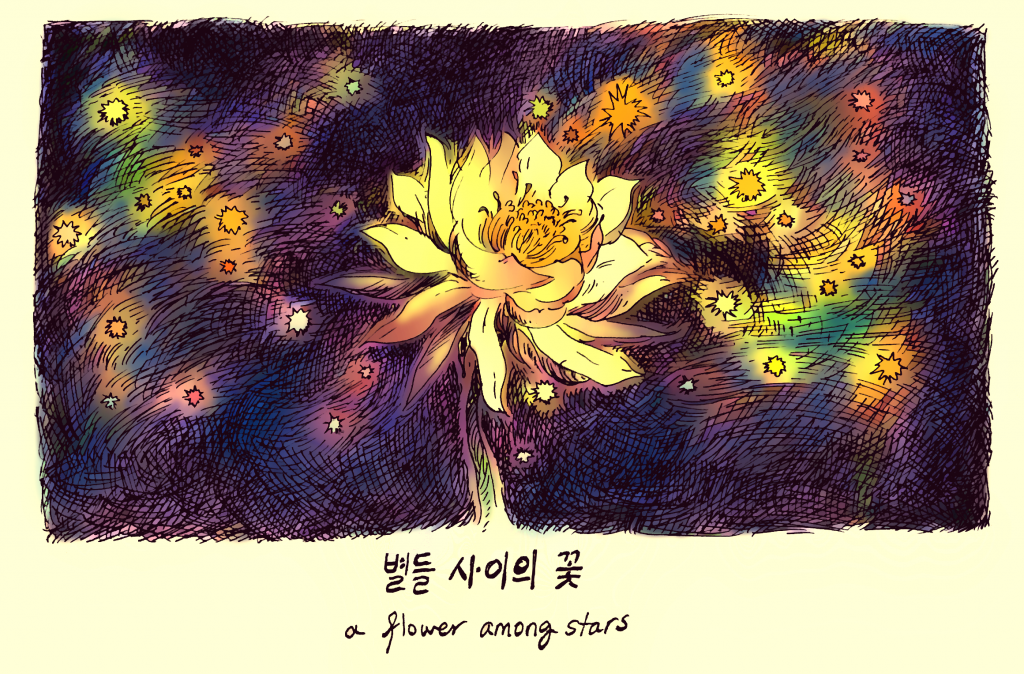
Sunmi: This is a big question haha, but I guess simply, fiction has always been a sanctuary for me to explore who I want to be and what I want to see in the world, those things being: queer and part of a community. Inevitably it will always come through in the characters I write and the worlds I create, and also affect how I continue to exist and grow in the real world. As for magic, myths & nature, I also just feel that they are a part of the human experience, especially for people of ethnic and colonized backgrounds, so I feel most myself when I’m not only with other people who understand me, but also when I have the ability to be present in the landscapes of our natural world.
Sam: Your colors really blow me away, and your line work also stands out to me. It’s so interesting to look at your artwork, since in a lot of colorful drawings and paintings, I feel like artists sometimes lose their linework. But for your comics, the colors and lines layer together beautifully. How would you describe your approach of colors and lines in creating movement and emotional impact?
Sunmi: I just find that lines are wonderful and important to cartooning in general, especially as seen in manga and international comics. I approach color secondhand to line and prefer to only use color if I feel a piece would benefit from the mood achieved by adding it. I think black ink is already very emotional and can achieve a lot in the same way film has for centuries without color. Well, we have also done a lot with ink throughout all of human history! But also when I work with stuff like risograph, it makes me think about how much I like individual colors for what they evoke… I think pigments are really interesting, like indigo which has a long and complex history worldwide as well.
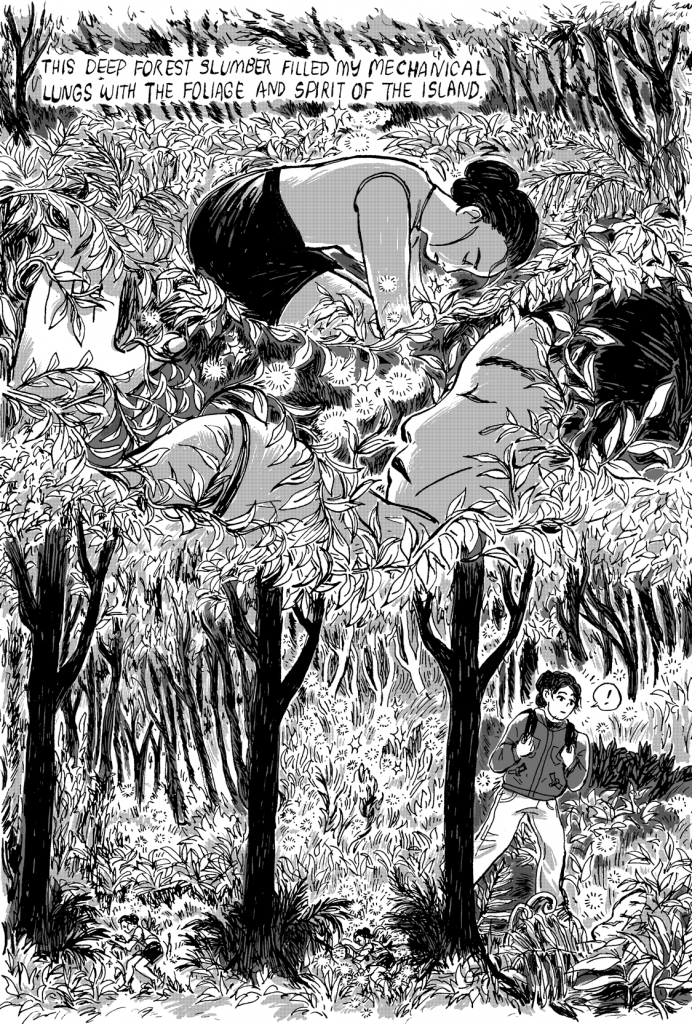
Sam: What is/are your favorite medium(s) to work with? All of your comics look so professional and are made with such purpose. But, I was wondering how experimentation plays a role in your comics-making?
Sunmi: Ink is my favorite above all, both in a drawing and printmaking context. I like painting too, and also fiber arts, film, photography, and clay. In my own daily practice, I still work with cheap paper and children’s crayons because of how it relieves pressure on me to make something “good.” I feel this way about making digital art too, quick and without a need to be too polished. Being precious with my own art makes me feel stifled and less satisfied with the end result. When I let spontaneity have a presence in my process, then I started to both have more fun with it and found that others responded just as well. Though I also recognize that I am a trained artist and by studying art for a lifetime, even if not so formally until college, I have a technical skill set that developed naturally and through my own “diligence” (I am not *that* diligent however haha).
Sam: I’m very interested in your comic about Jeju Island for Heartwood anthology. Would you mind explaining more about your process of creating a comic about a Korean island that has been colonized by both America and Japan? As well as this concept of emotional distance?
Sunmi: Haha, yeah the other thing that I write in all my bios now… “emotional distance.” I have never been to Jeju myself, or at least I don’t think I have when I visited Korea as a kid… so I feel silly now that I wrote a comic that takes place there. After all, I’m not a local to the area, so how could I preach to know about issues that they face, beyond reading about them? That comic really was more about reflecting on my own experiences and connections to ideas of family and homeland and particularly the disconnect. I do think that speculative fiction rooted in non-Western settings is great and if someone out there (or if I??) put the time into making a proper comic about the political and ecological issues that people on Jeju Island face, that’d be rad. As for why I continue to explore “emotional distance,” it’s because I think I’ve spent most of my time trying to understand how to connect to other people. Bridging the distance between myself and others in my life is a continuous journey.
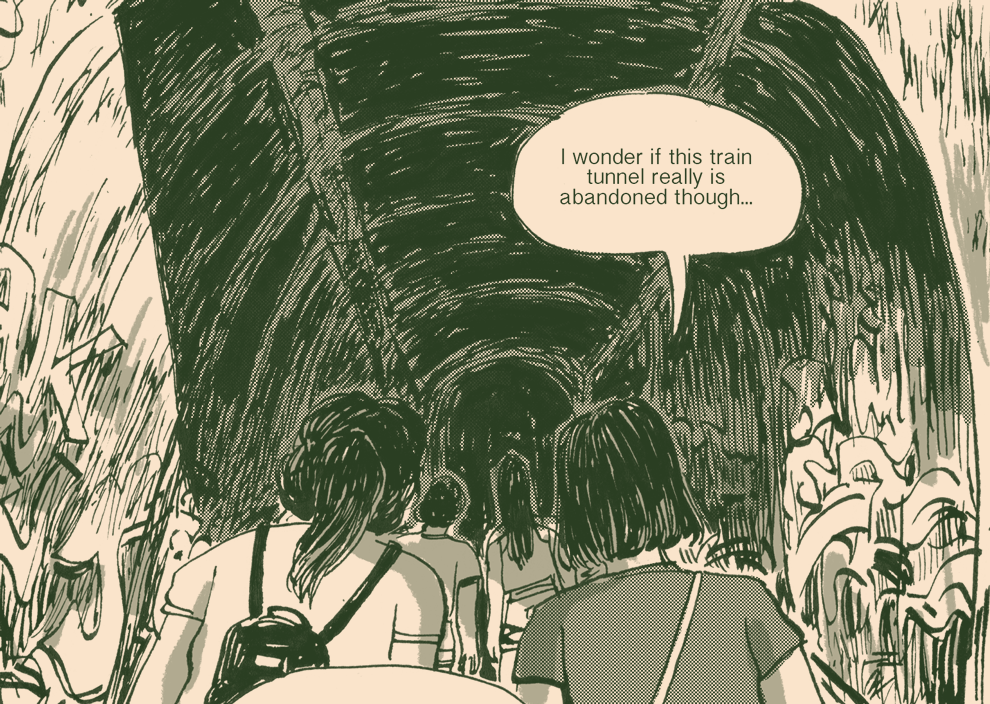
Sam: In your comics, there’s so much movement and life to even stationary things, especially plants and forests… how do you see nature? I imagine you have a very interesting perspective.
Sunmi: I just like stationary things, whether natural or manmade… I like the idea that there’s life in everything that exists and everything that we make… Nature is amazing and we should cherish it and concede land to and trust the proper stewardship of it to indigenous peoples.
Sam: I was so blown away by your zine, Love Letters to the Sea Goddess. As someone who does a lot of nonfiction and historical comics, I was curious what inspired you to make this comic—did you decide to make it after your research of various mythologies, or was there another source of inspiration? Do you see a relationship between research and your creation of comics?
Sunmi: I did do quite a bit of research on myths around sea goddesses for that zine, though I feel like I could always do more. I don’t know where the initial idea or inspiration came from. I think it’s just random. My brain thought “sea goddesses are cool I wonder what myths exist for them” and then spent a week reading random articles online before landing on the three I chose for the zine (Mazu, Iemanjá, & Thalassa). It was nice that it allowed me to connect to others who have relationships with those practices, like a local barber who bought a print and told me about his orisha Oshun. These days I have become even more engaged with the concept of devotion, in various contexts, and what it means to be devout to something, or someone. I have recently embraced spirituality in my life again, and have been learning more about Buddhism, Taoism, and other Korean and pan-Asian folk religions. Ideas don’t exist in a vacuum and I have a very obsessive brain.
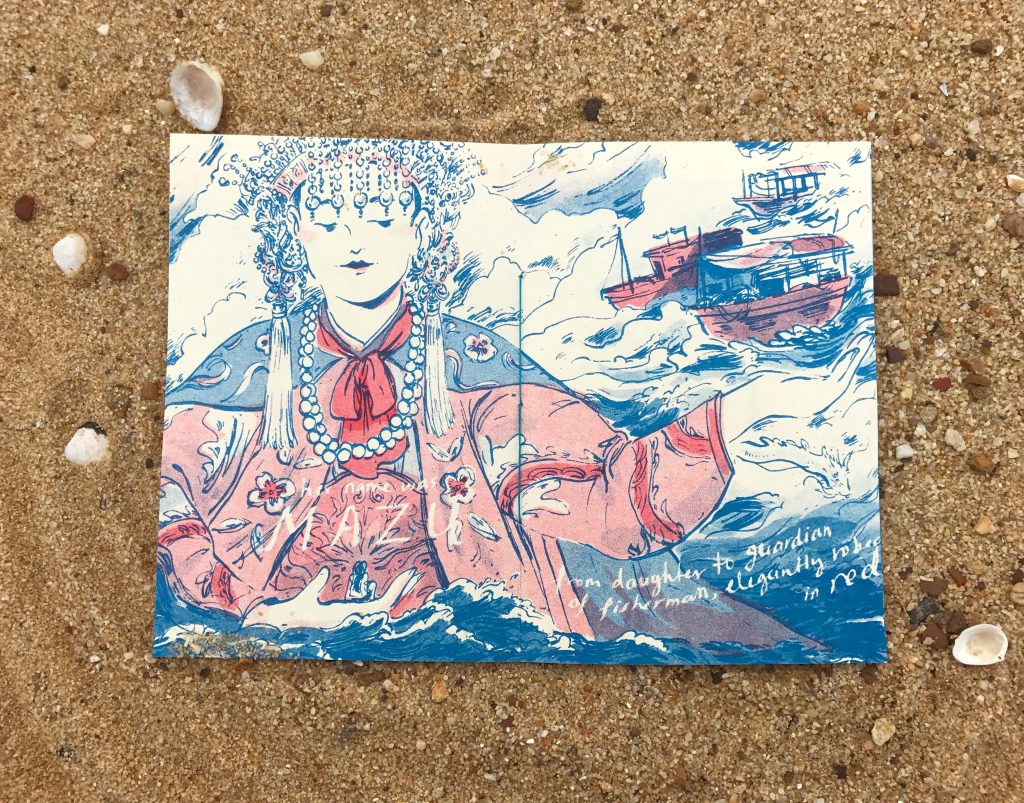
Sam: I’m excited to read your upcoming graphic novel, Firebird! Would it be alright if I ask about your ideas behind the comic? Also, how does it feel to be working with a large publishing company as opposed to your independent comics and zine-making?
Sunmi: Thanks, I’m glad you are excited even though that is also pressure and sometimes pressure scares me! The idea of Firebird… hm… I think it came about because I do enjoy cheesy American high school rom-coms where a bad boy meets a good girl, even if I can’t exactly relate because I’m not white or straight. I guess that’s a trope in shoujo manga too. So there’s a “goody-two-shoes” sophomore named Caroline who has to be a peer tutor for a “bad girl lesbian” named Kim, a senior about to graduate, and they’re both raised mostly alone by Asian immigrant mothers, and they both have a lot going on at home… The core emotion being the confusing and notably queer feeling of being uncertain if what you feel for someone is admiration or attraction. Do I like you or do I wish I could be like you? It’s written from my memories of the kids I knew in high school, most of whom I haven’t kept in touch with, so it’s kind of weird I think. Well, it’s going to be weird for me anyway when I finish it and it’s at the book store, and people are going to expect more from me…
Anyway, I will be real and say if I wasn’t publishing this book with a large company, then I’d be unemployed or working a service job in the pandemic, so I really don’t know how to feel other than grateful for my fortune and angry at the world. Being a part of indie comics and making zines will forever be important to me because I met my most cherished friends through it, and I value accessibility, DIY ethos, and people power above everything.
Sam: What do you hope that readers take away from your comics?
Sunmi: Truthfully, I just hope they are entertaining enough, or that people found something meaningful to them reflected in my comics… I am really just happy when someone says “that was cool, thanks!”
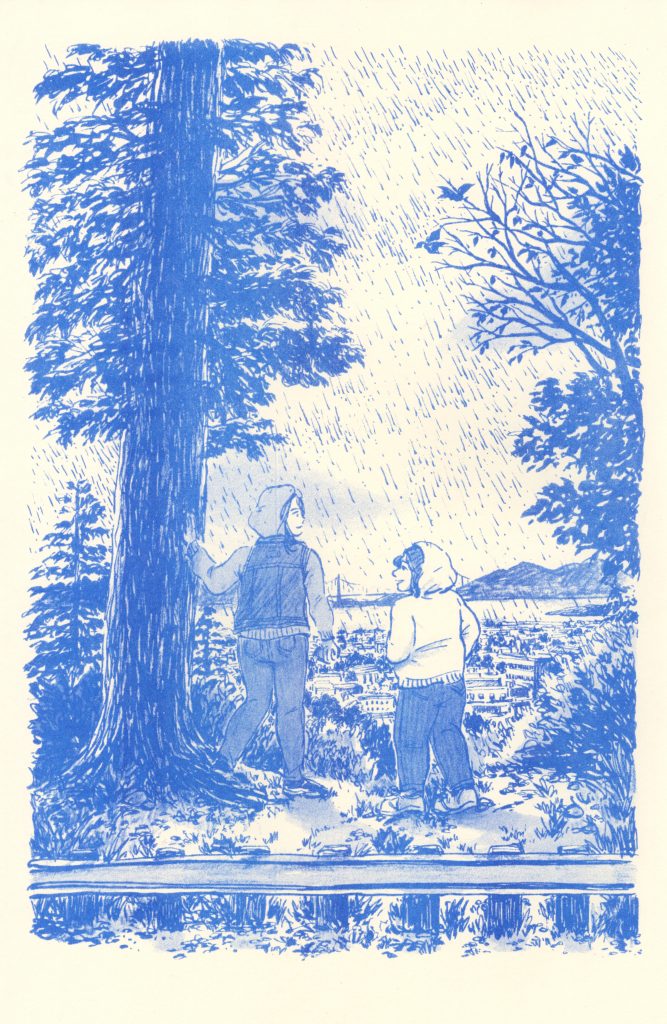
Sunmi’s work can be found at their website at www.sunmiflowers.com, and on @sunmiflowers on Twitter and Instagram.
SOLRAD is made possible by the generous donations of readers like you. Support our Patreon campaign, or make a tax-deductible donation to our publisher, Fieldmouse Press, today.

Leave a Reply